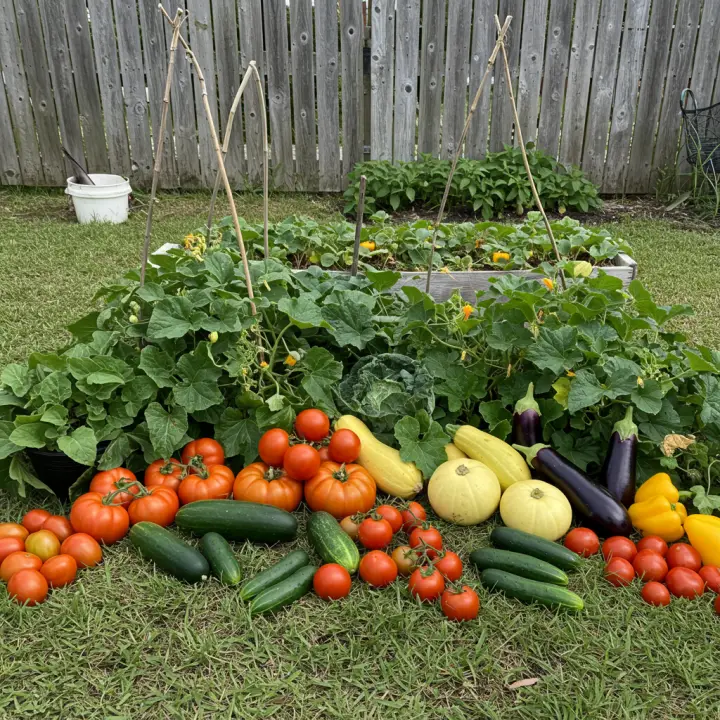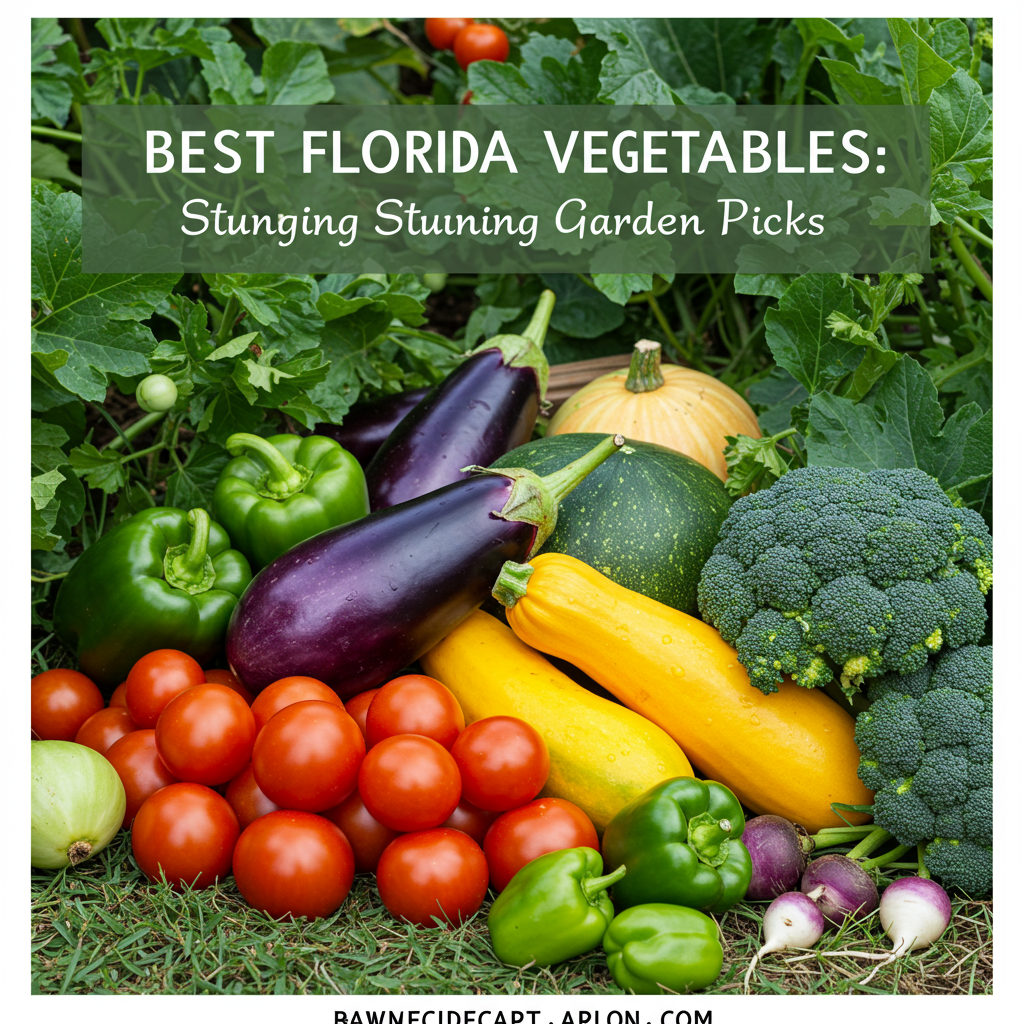Grow a thriving garden filled with the Best Florida Vegetables by choosing varieties perfectly suited to the Sunshine State’s unique climate. This guide explores the top vegetable choices for Florida gardens, from heat-loving staples to surprising cool-season delights, and provides essential tips for a successful harvest.
Florida’s subtropical climate offers a unique opportunity for year-round gardening. Choosing the right vegetables is crucial for a bountiful harvest. This guide will help you select the best Florida vegetables for your garden, whether you’re a seasoned gardener or just starting out.

Choosing the Best Florida Vegetables
Florida’s climate allows for diverse gardening options. Understanding your growing season, which varies across the state, is the first step to success. North Florida experiences a more distinct change in seasons, while South Florida enjoys warm weather almost year-round.
Warm-Season Wonders: Thriving in Florida’s Heat
Summer in Florida can be intense, but these vegetables love the heat and humidity:
Tomatoes: A garden classic, tomatoes thrive in Florida’s warmth. Choose heat-tolerant varieties like ‘Solar Fire’ and ‘Florida 91’ for best results.
Peppers: From sweet bell peppers to fiery jalapeños, peppers are another excellent choice. ‘Ace’ bell peppers and ‘Early Jalapeño’ are good options.
Beans: Bush beans and pole beans are productive in Florida’s summer heat. Consider ‘Contender’ bush beans and ‘Kentucky Wonder’ pole beans.
Squash and Zucchini: These prolific growers need plenty of space. ‘Yellow Crookneck’ squash and ‘Black Beauty’ zucchini are popular choices.
Eggplant: Heat-loving eggplants produce abundantly in Florida. ‘Black Beauty’ and ‘Florida Highbush’ are recommended varieties.
Okra: This Southern staple thrives in hot, humid conditions. ‘Clemson Spineless’ is a popular choice for its tender pods.
Sweet Potatoes: A nutritious and delicious root vegetable that loves Florida’s warm soil. ‘Beauregard’ and ‘Centennial’ are good varieties to try.
Watermelon: Nothing says summer like a juicy watermelon. ‘Crimson Sweet’ and ‘Jubilee’ are excellent choices for Florida gardens.
Cool-Season Champions: Taking Advantage of Florida’s Mild Winters
Even in Florida, you can enjoy cool-season crops during the milder months:
Lettuce: Leaf lettuce, romaine, and butterhead varieties thrive in Florida’s winters. ‘Black Seeded Simpson’ and ‘Rouge d’Hiver’ are excellent options.
Spinach: Another leafy green that enjoys cooler temperatures. ‘Bloomsdale Long Standing’ is a good choice for Florida gardens.
Broccoli: This nutritious vegetable produces well in Florida’s mild winters. ‘Waltham 29’ and ‘De Cicco’ are recommended varieties.
Cauliflower: Similar to broccoli, cauliflower prefers cooler temperatures. ‘Snow Crown’ and ‘Cheddar’ are good options.
Carrots: These root vegetables prefer cooler soil. ‘Nantes’ and ‘Imperator’ are good varieties to try.
Radishes: A quick-growing crop that adds a spicy kick to salads. ‘Cherry Belle’ and ‘French Breakfast’ are popular choices.
Peas: English peas and snow peas thrive in Florida’s milder months. ‘Lincoln’ and ‘Oregon Sugar Pod II’ are good varieties to plant.
Essential Tips for Growing Vegetables in Florida
Know Your Soil: Florida soils can be sandy or clay-rich. Amend your soil with compost to improve drainage and fertility.
Watering Wisely: Water deeply and less frequently to encourage strong root growth. Consider using drip irrigation for efficient watering.
Fertilizing for Success: Florida’s sandy soil can leach nutrients quickly. Regular fertilization is essential for healthy plants.
Pest and Disease Control: Be vigilant about monitoring for pests and diseases. Use organic methods whenever possible.
Sunlight Requirements: Most vegetables need at least 6 hours of sunlight per day. Choose a sunny location for your garden.
FAQs: Your Florida Vegetable Gardening Questions Answered
Q: When is the best time to plant tomatoes in Florida?
A: The best time to plant tomatoes in Florida depends on your location. In South Florida, you can plant tomatoes in the fall and winter. In North Florida, spring is the ideal time to plant.
Q: What are some common pests in Florida gardens?
A: Common Florida garden pests include aphids, whiteflies, nematodes, and caterpillars.
Q: How can I protect my plants from the intense Florida sun?
A: Provide shade cloth during the hottest part of the day, especially for young seedlings.
Q: Can I grow vegetables in containers in Florida?
A: Absolutely! Container gardening is a great option for small spaces or patios. Choose large containers and use a well-draining potting mix.
Q: Where can I find reliable information about Florida gardening?
A: Your local University of Florida IFAS Extension office is an excellent resource for information on Florida gardening.
Conclusion: Harvesting the Rewards of Your Florida Garden
Growing vegetables in Florida can be a rewarding experience. By selecting the right varieties and following these essential tips, you can enjoy a bountiful harvest of fresh, flavorful vegetables throughout the year. From the warmth-loving staples of summer to the surprising cool-season delights of winter, Florida’s unique climate offers a diverse range of possibilities for the enthusiastic gardener. So, dig in, get planting, and savor the taste of your own homegrown Florida vegetables!

